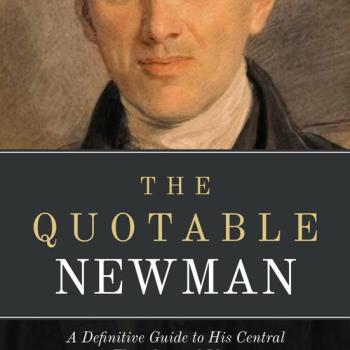Editors' Note: This article is part of the Patheos Public Square on Has Hollywood Become Our National Conscience? Read other perspectives here.
We Americans live in a culture that is stuffed past capacity with media. Barely a second goes by that some ad, some tweet, some gif, or some viral video is not trying to elbow everything else out for our notice. In the years since the internet went from an obscure activity for nerds and teenagers to the one thing none of us can live without, channels of media have proliferated like a virus against which we have no defense.
So if media is not our public conscience, it certainly is the biggest source of raw material for our consciousness. Media in all forms constitute the lingua franca of the global dreamscape.
The difference between conscience and consciousness is critical. It represents the biggest failure of contemporary American media. The art of creativity, especially filmmaking, is a kind of magic. It is no small thing to take people completely out of their own lives for a significant length of time, to take total command of their consciousnesses. Think about yourself at a really good film. Do you even know where you are? Do you think about anything else while you watch it? Do you dream about it later? Does it go on affecting you long past the final credits? The power of this kind of art is enormous and, I believe, not to be taken lightly.
But the vast majority of media is inseparable from its roots in the profit motive of market economics. Therefore, like it or not, it is the very rare maker of media whose job it is to wonder how the product he or she is selling shapes the end-user's moral imagination. With so little breathing room, psychically speaking, outside of this cacophonous landscape, a consumer is very unlikely to be able to weave together a coherent sense of reality — and of his own values — without tapping into all he's seen and heard for all his life.
Once in a while a piece of media will emerge from the shouting that, either by accident or on purpose, has the effect of engaging the moral imagination of the public at large. A film like The Help, or Forrest Gump, Pay It Forward, or Lincoln somehow capture the popular imagination while also promoting values like decency, honesty, and peacefulness.
But media like this is rare. It certainly cannot make up for the mayhem, disrespect, and violence that otherwise populate our entertainment landscape. And, with the exception of only a few films, this kind of media also rarely outdraws the less well-intended material with which it competes. Of the twenty-five top grossing films in 2015, only ten did not feature sex and/or violence as their primary plot drivers and of those ten, only two, Pitch Perfect and The Martian were not primarily marketed to children. I am pretty sure that we do not cease to need to think about what it means to live as decent human beings the day we get the right to vote and drink — quite the opposite!
As a documentarian I take very seriously the power of my craft and I believe it is my greatest responsibility to use that power to change people for the better, to expand their hearts and minds and to make them look at things differently. I have seen audiences who are willing to stay for hours to talk about how to be better people, about how to build movements for change, about how to make their governments more fair, more honest, more respectful. I have seen men and women changed in the blink of an eye and I cannot describe what a joy that is.
With all my heart I wish that more people who made media did so with an eye toward its moral consequences. I think that will never happen unless you and I as consumers make a decision to stop rewarding media that promotes values that violate our deepest beliefs and to reward instead the media that brings out the best in us all. Ultimately, it is only we, the consumers, who have that power and only we can make this landscape more hospitable to our families, our values, and ultimately to our children.
 Follow Abigail Disney on Twitter at @AbigailDisney or on Facebook at www.facebook.com/abigail.disney/. Learn more about The Armor of Light on Twitter at @ArmorTheFilm, on Facebook at https://www.facebook.com/ArmorTheFilm//a>, or at http://www.armoroflightfilm.com.
Follow Abigail Disney on Twitter at @AbigailDisney or on Facebook at www.facebook.com/abigail.disney/. Learn more about The Armor of Light on Twitter at @ArmorTheFilm, on Facebook at https://www.facebook.com/ArmorTheFilm//a>, or at http://www.armoroflightfilm.com.
2/17/2016 5:00:00 AM




